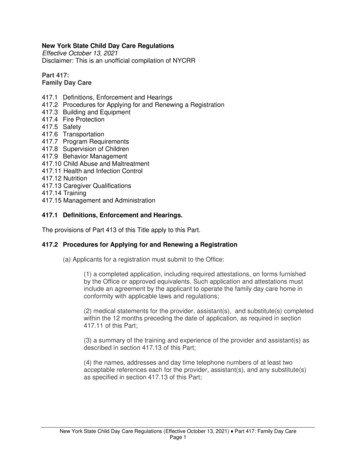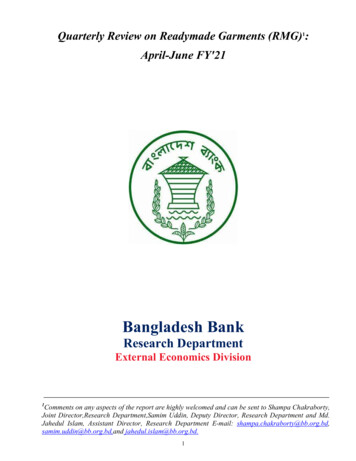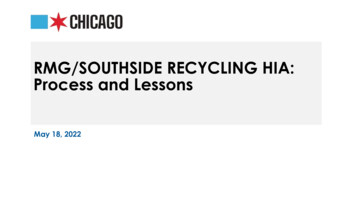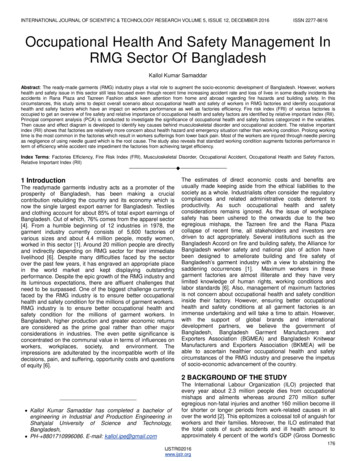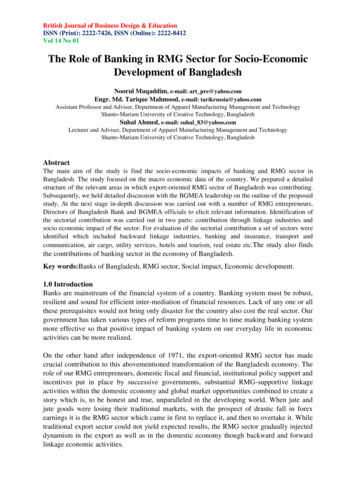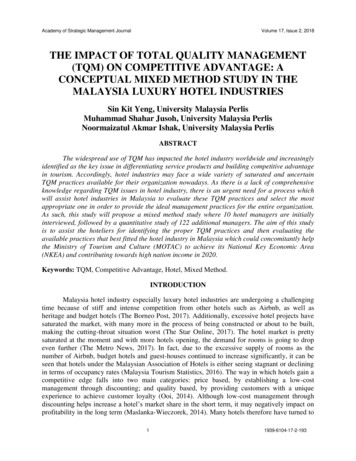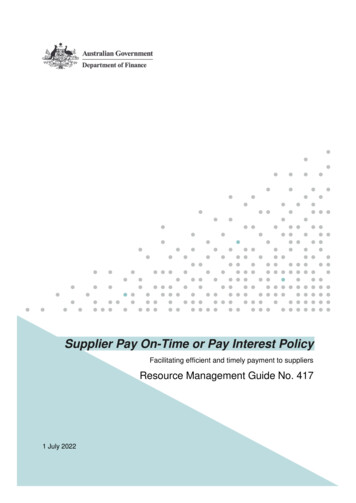
Transcription
Supplier Pay On-Time or Pay Interest PolicyFacilitating efficient and timely payment to suppliersResource Management Guide No. 4171 July 2022
Department of FinanceRMG-417: Supplier Pay On-Time or Pay Interest Policy Commonwealth of Australia 2022ISBN: 978-1-925537-79-6 (Online)With the exception of the Commonwealth Coat of Arms and where otherwise noted, allmaterial presented in this document is provided under a Creative Commons Attribution 3.0Australia (http://creativecommons.org/licenses/by/3.0/au) licence.The details of the relevant licence conditions are available on the Creative Commons website(accessible using the links provided) as is the full legal code for the CC BY 3 AU licence.Use of the Coat of ArmsThe terms under which the Coat of Arms can be used are detailed on the following act usPlease direct questions or comments about the guide to:Department of FinanceProcurement Policy Branch1 Canberra AvenueForrest ACT 2603Email: procurementagencyadvice@finance.gov.auInternet: policy-rmg-4172
Department of FinanceRMG-417: Supplier Pay On-Time or Pay Interest PolicyContentsSupplier Pay On-Time or Pay Interest Policy1Audience4Key points4Resources4Objective5Part 1 – Policy5Limits of the application of this Policy5Part 1.2 – Practice6Paying and Calculating Interest6Calculating Interest6Example of Calculating Interest for 20 Calendar Day Payment Terms6Example of Calculating Interest for 5 Calendar Day Payment Terms for eInvoicing7Part 1.3 – Example Draft Contractual Clauses7Example clause to establish 20-day payment terms and late interest7Part 2 - Payment Card policy for payments valued below 10,0008Part 3 – Definitions93
Department of FinanceRMG-417: Supplier Pay On-Time or Pay Interest PolicyAudienceThis guide is relevant to all non-corporate Commonwealth entities (NCEs). It is particularlyrelevant to Chief Financial Officers (CFOs) and their staff, and officials who are responsiblefor the NCEs internal controls and processes.Corporate Commonwealth entities (CCEs) are encouraged to apply this policy.Key pointsThis guide: outlines the Government’s policy on payment timeframes for invoices arising fromprocurement contracts that are subject to the Commonwealth Procurement Rules; outlines the Government’s policy on the use of payment cards for purchases of goodsand services with a total contract value below 10,000; uses terms as defined in the Commonwealth Procurement Rules; and uses GST inclusive values.ResourcesThis guide is available on the Department of Finance website at www.finance.gov.au.Other relevant publications include: additional information on this -additionalinformation online interest /information-sheet/interest-calculator Commonwealth Procurement ement/commonwealth-procurementrules general interest charge t-charge-(GIC)-rates/ additional information on electronic invoicing oicing/4
Department of FinanceRMG-417: Supplier Pay On-Time or Pay Interest PolicyObjective1.This policy facilitates timely payment to suppliers, assists with their cash flow, andreduces the cost of supplying to the Commonwealth.2.As a general principle, NCEs are encouraged to implement efficient and timely receiptingand payment practices to ensure that supplier payments are made as quickly aspossible.Part 1 – Policy3NCEs must make all payments to suppliers within the maximum payment terms,following the acknowledgement of the satisfactory delivery of goods or services and thereceipt of a correctly rendered invoice.i. Once the NCE has acknowledged the satisfactory delivery of the goods or servicesand a correctly rendered invoice has been received, the maximum payment termsapply from the start of the next calendar day.ii. The policy does not require payment by NCEs on invoices that are not correctlyrendered and/or where goods and services are not satisfactorily received inaccordance with a contract.iii. The policy does not require payment by NCEs on disputed amounts. Where anamount is disputed, the NCE may request to make payment after receiving aninvoice.4The maximum payment terms are:i. 5 calendar days for electronic invoicing (eInvoicing), where an NCE and a supplierboth have the capability to deliver and receive eInvoices through the Pan-EuropeanPublic Procurement On-Line framework and have agreed to use this method ofinvoicing; orii. 20 calendar days for all other invoices, unless shorter maximum payment terms areagreed between an NCE and a supplier.5Where an NCE has not made payment in full within the maximum payment terms, it mustcalculate interest in accordance with paragraphs 14 and 15 below, and pay that interestto the supplier if the amount accrued is more than A 100.6NCEs must ensure that any written approach to market documentation or writtencontract with a supplier includes clauses that reflect this policy. However, this policy stillapplies even if a written contract or approach to market fails to include clauses thatreflect this policy, or if no written contract exists between the NCE and the supplier.Limits of the application of this Policy7This policy does not apply if: procuring and consuming goods and services overseas; procuring real property, including leases and licences;5
Department of FinanceRMG-417: Supplier Pay On-Time or Pay Interest Policy the funding source for the procurement is an administered appropriation; the nature of the goods or services being procured, or the structure of theprocurement, would make it impractical for the policy to be applied, such as wherethe procurement occurs under standard terms and conditions put forward by thesupplier rather than the NCE; prior to the date of effect of this policy, a contract or standing offer was already inplace or in the process of being negotiated; procuring from a Commonwealth entity; or the payment arises from a non-procurement arrangement, such as a grant.Part 1.2 – Practice8Once the NCE has acknowledged the satisfactory delivery of the goods or services anda correctly rendered invoice has been received, the maximum payment terms apply fromthe start of the next calendar day.Paying and Calculating Interest9When interest is payable, NCEs should make a self-generated interest payment to thesupplier for any outstanding simple interest accrued. An online calculator, available onthe Department of Finance’s website, may assist entities to calculate penalty interest.Calculating Interest10 Interest is payable at the general interest charge rate available on the ATO’s website,calculated for each calendar day from the day after payment was due up to andincluding the day that payment was made. If the maximum payment terms fall on anon-business day, payment is not due until the next business day.11 Interest should be calculated on GST inclusive amounts, however interest itself is notsubject to GST.Example of Calculating Interest for 20 Calendar Day PaymentTerms12 A NCE makes a payment 33 calendar days after acknowledging satisfactory delivery ofthe goods or services and receiving a correctly rendered invoice, with maximumpayment terms of 20 calendar days. The value of the unpaid amount is 100,000.Assume the following: the relevant daily general interest charge rate is 0.02339726% (current rates areavailable on the ATO website and are updated quarterly); the first day of the payment terms is the calendar day following either the date ofacknowledgement of the satisfactory delivery of the goods or services, or the date ofreceipt of a correctly rendered invoice (whichever is later); and6
Department of FinanceRMG-417: Supplier Pay On-Time or Pay Interest Policy payment occurs 13 calendar days after the conclusion of the 20 calendar daypayment period specified in the written contract. The date of conclusion of thepayment period is the day that the payment was made by the NCE.Interest paid 100,000 x (0.02339726 / 100) x 13 304.16Example of Calculating Interest for 5 Calendar Day Payment Termsfor eInvoicing13 An NCE makes a payment 20 calendar days after acknowledging the satisfactorydelivery of the goods or services and receiving a correctly rendered eInvoice, withmaximum payment terms of 5 calendar days. The value of the unpaid amount is 100,000. Assume the following: the relevant daily general interest charge rate is 0.02339726% (current rates areavailable on the ATO website and are updated quarterly); the first day of the payment terms is the calendar day following either the date ofacknowledgement of the satisfactory delivery of the goods and services, or the dateof receipt of a correctly rendered invoice (whichever is later); and payment occurs 15 calendar days after the conclusion of the 5 calendar daypayment period specified in the written contract. The date of conclusion of thepayment period is the day that the payment was made by the NCE.Interest paid 100,000 x (0.02339726 / 100) x 15 350.96Part 1.3 – Example Draft Contractual Clauses14 The following clauses provide an example of clauses which reflect the policy. Theseclauses are examples only and entities may draft their own clauses to implement thispolicy. If entities use the model clauses, care should be taken to ensure that they arecorrectly adapted to the relevant contract – e.g. by ensuring they are consistent with thelanguage used in the contract and do not conflict with other clauses and definitionselsewhere in the contract.Example clause to establish 20-day payment terms and late interestX.Payment TermsX1.The non-corporate Commonwealth entity will pay the Supplier within 20 calendardays after acknowledgement of the satisfactory delivery of the goods or services andreceipt of a Correctly Rendered Invoice. If this period ends on a day that is not aBusiness Day, payment is due on the next Business Day.Y.InterestY1.This Clause Y only applies where the amount of the interest payable exceeds A 100.7
Department of FinanceRMG-417: Supplier Pay On-Time or Pay Interest PolicyY2.For payments made by the non-corporate Commonwealth entity after the payment isdue, the non-corporate Commonwealth entity pays the unpaid amount plus intereston the unpaid amount.Y3.Interest payable under this clause Y will be simple interest calculated in respect ofeach calendar day from the day after the amount was due and payable, up to andincluding the day that the non-corporate Commonwealth entity effects payment asrepresented by the following formula:SI UA x GIC x DWhere:SI simple interest amount;UA the unpaid amount;GIC General Interest Charge Rate daily rate; andD the number of days from the day after payment was due up to and includingthe day that payment was made.Y4.In this clause Y “General Interest Charge Rate” means the general interest chargerate determined under section 8AAD of the Taxation Administration Act 1953 on theday payment is due, expressed as a decimal rate per day.Z.Correct rendering of invoicesZ1.For the purposes of clauses X and Y, an invoice is correctly rendered if:(a) it is correctly addressed and calculated in accordance with the Contract; and(b) it relates only to supplies that have been delivered to the non-corporateCommonwealth entity in accordance with the Contract; and(c) it is a valid tax invoice in accordance with A New Tax System (Goods andServices Tax) Act 1999 (Cth).Part 2 - Payment Card policy for payments valuedbelow 10,00015. This part refers to payments for purchases of goods and services with a total invoicevalue below 10,000. It does not apply to part payments made or invoices issued undercontracts with a total value of 10,000 and above. For further information, see thedefinition of eligible payment in Part 3 below.16. NCEs must pay via a payment card where the: payment is an eligible payment and valued under 10,000 (inclusive of GST andmerchant service fees1); the supplier can accept and request payment via a payment card; and1Costs due to the supplier (merchant service fees) may be passed on to the NCE when facilitating payment via a payment card.Merchant service fees are required to be limited to ‘reasonable cost’ for accepting the payment which may vary on the cardscheme used. Further guidance on merchant service fees is available from the Reserve Bank of Australia in Guidance Note:Interpretation of the Surcharging Standards (www.rba.gov.au).8
Department of FinanceRMG-417: Supplier Pay On-Time or Pay Interest Policy merchant service fees charged to the NCE are reasonable for the type of card beingused and are sufficiently disclosed prior to payment being made.17. NCEs should consider paying suppliers via a payment card, but may reasonably seek topay via an invoicing arrangement when: amounts owed are at, or above, 10,000; paying incremental or milestone payments, irrespective of whether the collectivevalue of the payments is below 10,000; the supplier requests payment via an invoicing arrangement; the supplier seeks payment through non-widely recognised payment cards; paying other Commonwealth entities; paying overseas-based suppliers; or paying third-parties on behalf of the NCE.18. NCEs must, to the extent practicable, provide suppliers an opportunity to requestpayment via a payment card for amounts below 10,000.19. NCEs must make payment via a payment card where requested by a supplier for eligiblepayments. Where practicable, payment should be made at the point of sale. A taxinvoice (receipt) must be provided by the supplier for the payment.20. The policy does not require payment by NCEs on disputed amounts. Where an amountis disputed, the NCE may request to make payment after receiving an invoice.21. NCEs are responsible for ensuring that relevant internal guidance is maintained to giveeffect to the policy.22. The policy requires NCEs to establish and maintain internal policies and processes tofacilitate the timely payment of suppliers through payment card processes. This includesprocesses to promote payment cards as a preferred option for eligible payments tosuppliers valued below 10,000.23. NCEs may choose to extend this policy to non-eligible payments or payments above 10,000 in line with their business needs.24. Suppliers may be unaware of the preferred payment option and reasonable effortsshould be made to make them aware of the opportunity. This should occur prior toreceiving goods or services.Part 3 – DefinitionsAcknowledgement of the satisfactory delivery of the goods or services means that theNCE has confirmed that the goods or services have been delivered in accordance with theterms of the contract.Business day means a day that is not a Saturday, Sunday, a public holiday or bank holidayin the place where the act is to be performed.9
Department of FinanceRMG-417: Supplier Pay On-Time or Pay Interest PolicyCorrectly rendered invoice means an invoice which is: rendered in accordance with all of the requirements of the written contract (note thatwritten contracts will often specify that the invoice must be a tax invoice and/or thatcertain information must be included in the invoice and/or the format of the invoice);and for amounts that are correctly calculated and due for payment and payable underthe terms of the written contract.Disputed amount means any amount issued by a supplier that in the NCE’s opinion, isincorrectly calculated and/or not due for payment.Eligible payment means a payment with a value less than 10,000 (inclusive of GST andmerchant service fees) due to a supplier that is not associated with a multiple-paymentcontract, or standing offer arrangement. Eligible payments may include payments made as aresult of purchase orders.General Interest Charge (GIC) Rate means the interest charge determined under section8AAD of the Taxation Administration Act 1953 on the day that payment is due. Details of theGeneral Interest Charge rate are available from the Australian Taxation Office website.Payment card means credit cards, debit cards, charge cards or any other type ofCommonwealth issued card, including virtual cards that are authorised to pay suppliers forgoods or services received at the point of sale. Examples of widely recognised paymentcards include American Express, Diners Club, MasterCard and Visa.Receipt means the day that the correctly rendered invoice is accepted by the NCE followingthe acknowledgement by the NCE of the satisfactory delivery of goods or services.The day that payment was made is the day that the NCE’s system generates a paymentrequest into the banking system for payment to the business.10
RMG-417: Supplier Pay On-Time or Pay Interest Policy 6 the funding source for the procurement is an administered appropriation; the nature of the goods or services being procured, or the structure of the procurement, would make it impractical for the policy to be applied, such as where

